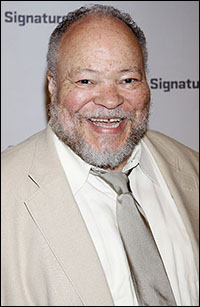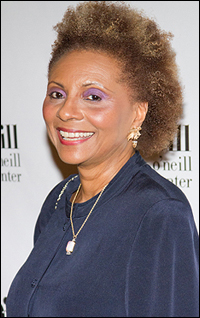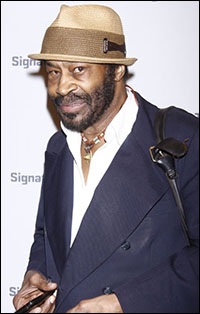
Pittsburgh is making itself at home at the Greene Space in lower Manhattan this month as New York Public Radio undertakes the ambitious task of recording readings of all ten of August Wilson's American Century Cycle plays, which largely revolve around Pittsburgh's Hill District.
The project has attracted a star-studded cast, including Phylicia Rashad, John Douglas Thompson, Clarke Peters, S. Epatha Merkerson, Keith David and Regina Taylor.
To honor Wilson and the project, Playbill sat down with six actors whose lives and careers intertwined with the great playwright. The roundtable was supposed to last for one hour but once the stories began flowing, the freewheeling conversation went on for more than 90 minutes. Below is an edited and condensed version.
The cast:
Ruben Santiago-Hudson, artistic director of the project, is perhaps the foremost interpreter of Wilson's work. He has acted in or directed most of these plays, winning a Tony Award as Canewell in Seven Guitars and an Obie and Lucille Lortel Award for directing The Piano Lesson. Stephen McKinley Henderson has acted in Fences, King Hedley II, Ma Rainey's Black Bottom and Jitney, earning a Drama Desk and an Obie Award for Jitney. He is associate artistic director.
Anthony Chisholm received a Tony nomination for his role in Radio Golf, won a Drama Desk and Obie as part of Jitney and appeared on Broadway in Gem of the Ocean and Two Trains Running.
Leslie Uggams earned a Tony nomiation for Best Actress in King Hedley II.
Ebony Jo-Ann was the understudy in both the original and revival productions of Ma Rainey's Black Bottom as well as for Gem of the Ocean.
Roslyn Ruff won an Obie Award in the revival of Seven Guitars, directed by Ruben Santiago-Hudson. She was also an understudy in the Broadway revival of Fences and was again directed by Santiago-Hudson in 2013's Off-Broadway production of The Piano Lesson.
Seeing August Wilson's Work
Ruben: You will never forget the first time you saw an August Wilson play. I saw Ma Rainey's Black Bottom. I actually saw half of it. I had no money to see all of it. I was sleeping on the floor of an apartment and had just come to New York City and they said, 'The black folks was doing a play.'
When I walked in there at intermission, when I slithered in there, I saw these people that I knew, then I heard them say things that I'd heard and I saw the way they walked and stood and wore their clothes. And I thought, 'I'm at home.' I came up in a rooming house and all of these guys lived there and the stories August's characters told were the stories I knew. I just knew I had to be a part of it in some way. When you hear it, you know you're alive.
Ebony: I lived in a house with these people. This is the way they talked. August's mom was a cleaning woman and my mother was as well. She walked from North Carolina to Pennsylvania.
Roslyn: When I see the plays, I'm reminded of my family in those conversations that I heard, and I'm amazed somebody has put them on stage in such an eloquent manner. My brother-in-law runs the Hill District credit union. I always say that if August was still alive and writing, that he would be a character, and that's all I'm saying.
Stephen: I was doing A Raisin in the Sun with Esther Rolle, and Delroy Lindo told us about the incredible play he was doing, Joe Turner. I had heard about August but hadn't seen his plays. Esther had an extra ticket and invited me. When I got to see and hear the language in that play, to hear the poetry and all that wisdom — it was wisdom and voices that I had heard growing up but it was what he had done with those voices, how he crafted them. August gave a gift to the whole world because he made it a message for everybody.
Leslie: I was doing Into the Woods in Pittsburgh and the director said, 'I just saw an August Wilson play and you've got to see it.' I had seen Ma Rainey, but when my husband and I went to see Jitney with Stephen and Anthony in it, our mouths were open. We were just in awe. We went backstage and had to hug each and every one of the cast. I was so moved.
| |
 |
|
| Stephen McKinley Henderson | ||
| Photo by Joseph Marzullo/WENN |
She got up on this stage and started touching things, she said, 'This was my grandmother's kitchen,' and I realized this was August's mission — he knew there were people who didn't see their life out there. He said, 'This is my mother's culture, these were sacred things and they were worthy of art.'
Working With August
Leslie: The key for me in learning the dialogue came when I realized his writing is music — people approach it like they do other playwrights, but you have to have the music in you. It's the blues.
Ebony: August loved the blues more than anything in the world. I imagine he felt an authenticity there.
Ruben: Many of his lines are from blues songs. Stephen: Even the play title "Two Trains Running" is a blues song.
Anthony: The first time I worked with him was at Yale and during the rehearsal breaks the smokers like myself would go out and start smoking. August would come out — I'm smoking two packs a day, he's smoking five. Five packs.
Anyway, he'd approach you and talk to you from the side at first, but we found out we were both boxing fans and we connected. After rehearsals we had four days off and I was in the hotel lobby going to catch a train to New York and he beckoned me over to where he was eating and said, 'I have a car outside. You can ride with me.' On that ride down he bore his soul to me for however many hours we were in that car. Most of what he said I've always kept to myself.
Stephen: He was such an incredibly gentle man, but then he could be fierce. That time in North Carolina...
Ebony: Oh my god. He jumped over the counter at the hotel.
Stephen: They were being disrespectful to him.
Ebony: He went ballistic.
Anthony: I've seen him do that three or four times.
| |
 |
|
| Leslie Uggams | ||
| Photo by Krissie Fullerton |
Anthony: And Turnbo grew up around a lot of women.
Stephen: Yes. August said people would always come up with elaborate things. It's got to be founded on the text, it has to have roots in there. Then he was fine with it.
Ebony: My memory is how Ruben used to harass him.
Ruben: We didn't speak for two weeks once. One time he said Floyd's a better musician then Canewell. I said 'No he's not.' I played Jimmy Rogers' "That's All Right" and asked him, 'What did you hear?' and he said 'The harp' and I said, 'That's Little Walter. And he eclipsed Jimmy Rogers, but it ain't about talent. Floyd is ambitious. I'm not. He wants money and fame. I just want three rooms and a garden.' So August finally said, 'All right,' and he let me get away with that. We argued about a lot of things with Canewell. He wanted me to pull my knife on Floyd. I didn't want to so we want back and forth, back and forth. Finally one day he said, 'You, Canewell, I'm writing for you.' Leslie: The first week I didn't even speak to August. I was so in awe of him. August would sit with eyes closed and arms folded and if you said one wrong thing those eyes would open up.
We were at the Goodman in Chicago through Thanksgiving and Christmas so I decided we would have a Thanksgiving dinner in our hotel room and I'd cook for everyone. I had the collard greens on my burner and the turkey in the oven, and Richard Brooks was downstairs so I said, 'I'm going to do the yams in your oven.'
I was so honored that August came. And then he said, 'Ms. Uggams you know how to cook, honey. This is one of the best Thanksgivings [I] ever had.' I was floating from then on.
My character Rose just used to hum, then it became a couple of lines, then all of sudden August came in and said, I've written a whole song for you, and I went, 'Wow, those collard greens must have been really good.'
On Lloyd Richards, August's Mentor and First Director
Ebony: August Wilson and Lloyd Richards were a package deal. They were like glue, during the mentorship period.
Ruben: Lloyd was the final say. He was the consummate leader, so we feared nothing. He offered us insulation so we could do our art. And you didn't want to disappoint him. Even August was under his leadership. It was a great marriage, and it hurt me because I was there when they had the divorce in Seven Guitars, on that journey. August had to outgrow the father. I understand that. But after Lloyd was gone it became a free-for-all.
Ebony: Lloyd spoke very quietly, he was never bombastic. He was like Buddha.
| |
 |
|
| Anthony Chisholm | ||
| Photo by Joseph Marzullo/WENN |
Leslie: Oh yes.
Ebony: When it got out of Lloyd's hands the whole empire started to crumble.
Leslie: I agree.
Stephen: August got directors for a time that would do what he wanted done. Anthony: The most horrible production of Jitney I was ever in was in Atlanta.
Stephen: The show was embraced by the audience, but it was a buffoonery, chitlin-circuit way of performing it from our director. We did other versions of it with Marion McClinton that were done the right way.
He still revered Lloyd. When he was writing King Hedley, with its classical tructure and even that name with King in it, he said to us, 'I think I got one the old man is going to like.'
On August's Death
Ebony: He told me during Gem of the Ocean, 'I have done what God put [me] on earth to do.' I didn't know what he was trying to tell me. He was trying to tell me, 'I'm leaving here.'
Anthony: He always showed up for rehearsals. He was always like that, if we did a show in six cities he'd do rewrites in every city. But then in L.A., at the Mark Taper, he wasn't there. I thought maybe he had other writing assignments — he was finishing up a Fences screenplay and he had a comedy he was working on, a strike between the undertakers and the coffin makers — but then his oldest daughter came and she had a faraway look and I just saw her thinking. And Constanza (his wife) came out and she had a similar look and it was announced that he was sick. He still faxed in rewrites for every scene.
Stephen: When they were doing Radio Golf, Anthony called and told me, 'It's close to the end.' So I called Lloyd and said what I heard. Then he called the house and he and August finally had a talk. He called me back and said, 'Thank you Mr. Henderson.' And I heard August was excited, saying, 'The old man called.'
Stephen: The service in Pittsburgh was incredible. When Wynton Marsalis played, that song...
Ruben: "Danny Boy."
Stephen: Talk about seeing grown men cry.
Ruben: I wasn't going to do it but my lip started, I see Henderson crying, Chisholm crying. August had asked for "Danny Boy." Wynton said he didn't know it but his brother said he drove from here to Pittsburgh listened to it on the way there. When he played that solo trumpet...
On the New York Public Radio Project
Anthony: I'm a disciple of August Wilson.
Leslie: Hear, hear.
Anthony: Great writers like Shakespeare were kept alive by the culture of their time. The only way for August to grow for our grandchildren and beyond is through something like this, so it's our respsonbility.
Ruben: What's important to me and Stephen is we do it for the kids. Every show we do one performance for them.
Stephen: We're passing the plays on to young people to inspire them, not just to be actors, but to be doctors and lawyers.
Ruben: As African-Americans, we have had to negotiate our place in America in a unique way, and people don't even know what we've gone through. This is not unique to August. What's unique is that he wrote it, he documented it. He fulfilled his responsibility. We have honor that. That's why we're here.
The readings continue through Sept. 28. Select plays will air on WNYC and other public radio stations in 2014. Live video webcasts, tickets and more information are available by visiting thegreenespace.org.










